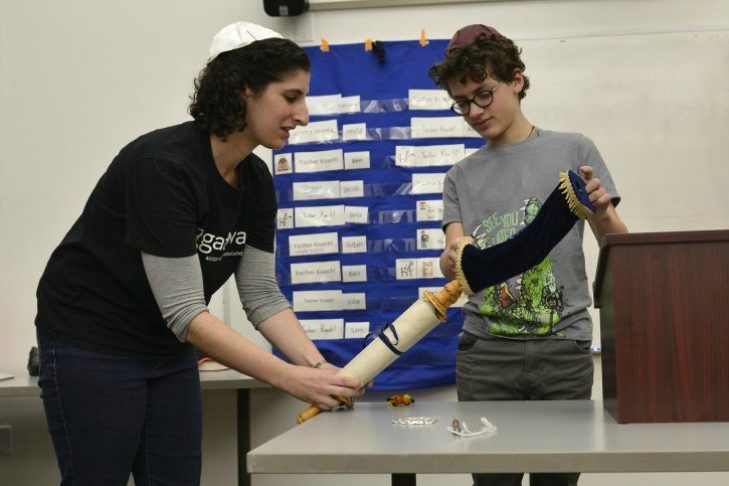Over the years, I have had countless conversations with cautious parents, usually beginning with one tentative question: “Can my child have a bar/bat mitzvah?” At Gateways: Access to Jewish Education, the answer is “yes.” For the past 16 years, the Gateways B’nei Mitzvah Program has prepared scores of children with disabilities to be comfortable, confident and successful during the celebration of their b’nei mitzvah.
The first component of the Gateways B’nei Mitzvah Program involves time when students and their tutors learn, pray and work together. (Every student is assigned a tutor with whom they work one-on-one for the first half of class.) As students arrive each afternoon, they are greeted warmly by their tutors and then whisked off to their comfortable individual work spaces. The b’nei mitzvah tutors are a group of passionate and well-trained Jewish adults from a wide range of backgrounds; in a given year, tutors may include college students, speech and language pathologists, general education teachers, special education teachers, clergy, librarians, lawyers, businesspeople and professors. The strong bonds between students and their tutors are clearly visible as you walk through the classroom and watch them work together in sessions that brim with energy and enthusiasm.
This individual attention from a skilled tutor allows students to work toward goals designed around their unique abilities and challenges. Some students learn how to decode Hebrew using a system of visual cues and mnemonic tricks, while others learn how to use an augmentative and alternative communication (AAC) device to lead prayers. Some students use a sight-word program to learn how to read transliterated prayers, while others engage in creative projects centered around their Torah portions. Many tutors use token boards, high fives, walks and fidgets to motivate their students and help them to focus.
When tutoring is over, the entire class gathers together for the second part of the program: a spirited prayer service (t’fillot), during which students practice their new skills. Every student is given a job to do. Some students chant Torah or lead the class in prayer, while others open the ark and carry the Torah. As students complete their jobs, the entire class congratulates them with an energetic yasher koach! Students grin with pride as they return to their seats, accepting handshakes from tutors and other students. The repetition of the prayer service each week, combined with the supportive atmosphere, enables once tentative students to stand confidently in front of the small congregation in preparation for their b’nei mitzvah.
The final portion of the program, a whole class activity, brings meaning to the experiences in tutoring and t’fillot. The curriculum of these activities was prompted and inspired by the question I could imagine many of my students grumbling to their parents as they make their way to class after an exhausting day at school: “But why do I have to go?” In the first unit of the curriculum, students learn through games, presentations and group work the importance of becoming a responsible Jewish adult and celebrating this milestone with their community.
The rest of the curriculum is based on questions that branch off from this original unit. For example, in order to explain the meaning of b’nei mitzvah, it is essential to teach what mitzvot are and the role they play in Jewish life. And in order to teach that mitzvot are commandments given to us by God, one must teach who God is and why we follow God’s commandments. The class dives into these basic yet complex concepts that live at the heart of Judaism so that students leave with a better understanding of their religion and spirituality. In the end, students are better able to place the bar/bat mitzvah experience in the context of their Jewish lives.
The Gateways B’nei Mitzvah Program prepares students for b’nei mitzvah, but it also does so much more. It brings together students of all abilities in a supportive community in which friendships blossom. It helps students gain confidence and feel accomplished at achieving long-term goals. And it helps them to better understand what it means to become a full adult member of the Jewish community.
Rebecca Redner is an educational specialist at Gateways.
This post has been contributed by a third party. The opinions, facts and any media content are presented solely by the author, and JewishBoston assumes no responsibility for them. Want to add your voice to the conversation? Publish your own post here. MORE


